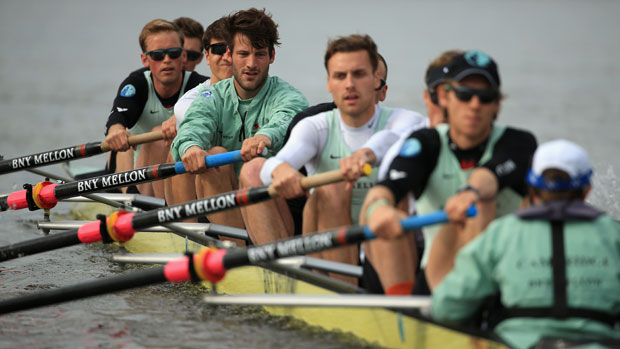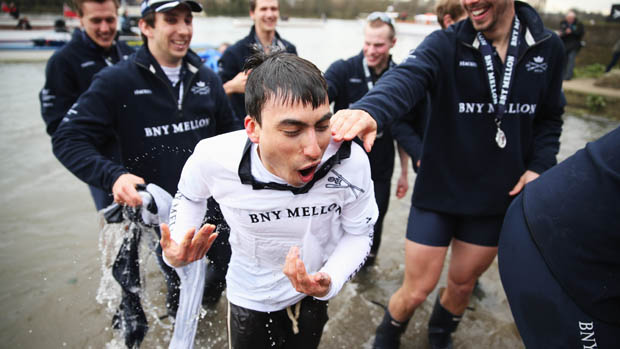Boat Race 2014: a history of pain, mutiny and sinkings
The colourful history of the Oxford and Cambridge Boat Race, one of the world’s oldest sporting fixtures

A free daily email with the biggest news stories of the day – and the best features from TheWeek.com
You are now subscribed
Your newsletter sign-up was successful
FEW events in British sport garner more attention than the University Boat Race, and this weekend the crews from Oxford and Cambridge take to the Thames for the 160th time, with Cambridge eager to redress last year’s length-and-a-half defeat.
Oxford meanwhile will be looking to secure their fifth victory in seven years, and with three Olympians and a former world champion among their crew, the dark blue boat is widely tipped as the favourite for Sunday’s race.
The courseSunday’s race from Putney to Mortlake will cover a gut-wrenching, lung-bursting, four-and-a-quarter miles – three times the distance of the longest Olympic race – and in such circumstances the winner is likely to be whoever can endure the most physical punishment. For The Spectator’s Roger Alton, that explains the appeal of the race as a spectator sport: the promise of a ‘‘gladiatorial’’ encounter where ‘‘it all comes down to guts and who has the greater pain threshold.’’
The Week
Escape your echo chamber. Get the facts behind the news, plus analysis from multiple perspectives.

Sign up for The Week's Free Newsletters
From our morning news briefing to a weekly Good News Newsletter, get the best of The Week delivered directly to your inbox.
From our morning news briefing to a weekly Good News Newsletter, get the best of The Week delivered directly to your inbox.
Crews train for a total of 1,200 hours in preparation for the 600-stroke Championship Course – meaning that two hours of effort lies behind each stroke.
The historyDevised by two former Harrovians studying at Oxford and Cambridge, Charles Wordsworth and Charles Merivale, the event first took place at Henley-on-Thames in 1829. Despite issuing the original challenge, Cambridge, dressed in pink rather than their contemporary light blue, lost the encounter by a heavy margin. The second race in the series, rowed between Westminster and Putney, did not take place until 1836, and for the next 25 years contests between the two universities were irregular. One obstacle to regular competition was disagreement over the race venue, with Oxford preferring Henley and Cambridge favouring central London. The race became an annual event from 1856, and moved to the stretch of the river between Putney and Mortlake in 1864.
Winner and LosersOxford holds the Boat Race trophy, but Cambridge still leads the series overall with a tally of 81 wins to Oxford’s 77. Cambridge also holds the record for the largest margin of victory, which came in 1839 when the light blue crew obliterated their dark blue rivals by 35 lengths. The only dead heat came in 1877 when the race umpire reportedly fell asleep at the finish line, and the closest victory came in 2003 when Oxford claimed victory by a single foot – a margin of victory almost unheard of in long distance rowing. The current record for the Championship Course stands at a 16min 19sec, which was set by Cambridge in 1998.
There’s mutiny afootThe history of the race is not without internal discord. The Oxford camp split over the election of their president in 1959, and a group of disenchanted oarsmen pushed for the formation of two separate crews. The plan was for these two crews to race against each other for the right to represent the university in that year’s race. The mutiny was put down by Oxford’s College Captains and three of the dissidents returned to the team for the race – which Oxford went on to win by six lengths. Another dispute, also in the Oxford team, came in 1987 when a number of international rowers withdrew in an argument over selection methods they deemed unfair. But despite the disruption Oxford went on to win once again – with a race-day crew filled out by reserves.
A free daily email with the biggest news stories of the day – and the best features from TheWeek.com
That sinking feeling... There have been six sinkings since 1829, but the end result has only been determined by a sinking on three occasions: 1859, 1925 and 1978. Both boats sank in 1912, and in 1984 Cambridge struck a barge and sank before the race even got underway. The event was postponed and Oxford claimed victory the following day.
External influenceOther factors have also played a part. The two world wars resulted in prolonged breaks from competition, and in 2012 Trenton Oldfield sabotaged the event in what he described as a protest against elitism.
Goats, not boats And if boats aren’t really your thing, Spitalfields City Farm has run an alternative “goat-race” for the past six years. The two competitors, Barney and Bramble, will don university blues once again this Sunday.
-
 The broken water companies failing England and Wales
The broken water companies failing England and WalesExplainer With rising bills, deteriorating river health and a lack of investment, regulators face an uphill battle to stabilise the industry
-
 A thrilling foodie city in northern Japan
A thrilling foodie city in northern JapanThe Week Recommends The food scene here is ‘unspoilt’ and ‘fun’
-
 Are AI bots conspiring against us?
Are AI bots conspiring against us?Talking Point Moltbook, the AI social network where humans are banned, may be the tip of the iceberg
